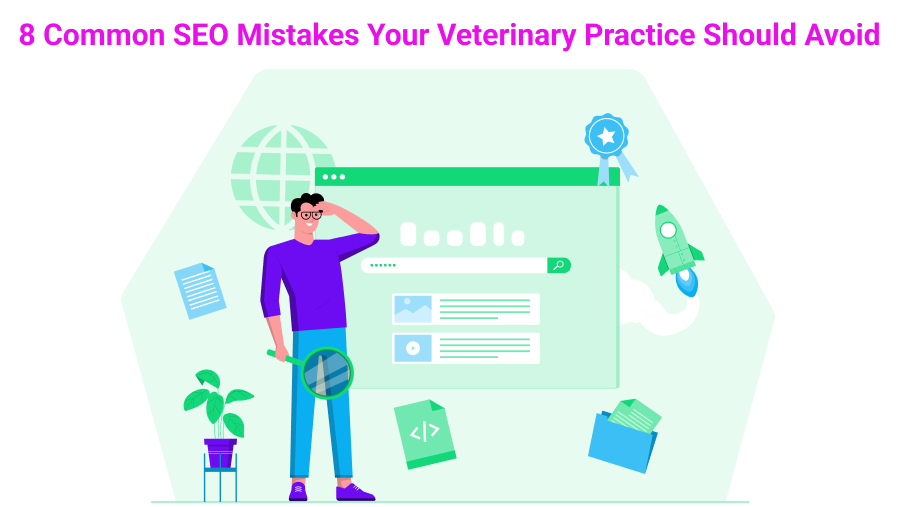Table of Contents
1. Failing to Optimize Your Website for Local Search Results
2. Forgetting to Conduct Keyword Research
3. Having Low-Quality Content
4. Ignoring Backlinks
5. Not Taking Advantage of Social Media
6. Failing to Include Videos
7. Using Improper Anchor Text
8. Failing to Make Your Site Mobile Friendly
Improve Your SEO Strategy
8 Common SEO Mistakes Your Veterinary Practice Should Avoid
Elliott Greenwood
May 19, 2023 · 5 min read

Want to improve your veterinary practice’s SEO strategy? Here are 8 common SEO mistakes to avoid and how to best fix them. This will save you time in the long run as your veterinary practice climbs up the organic rankings in search engine result pages.
You have enough on your plate where you don’t want to fix some common SEO mistakes that your practice might be making. Unfortunately, these mistakes are detrimental to your veterinary practice's SEO strategy and may even lower your rankings in search engines.
Just as if you’re you're in a boat with a hole in it and water is coming in the bottom. Your first instinct might be to try and bail out the water. While you might think this is helpful, really your first step should be to stop and fix the hole. Then you can worry about getting the rest of the water out.
Likewise, in some situations, it's more important to stop a problem from getting worse before you start trying to fix the existing damage.
The same goes for some of the most common search engine optimization mistakes. Avoiding these common mistakes will ensure that your vet practice’s site is functioning at a high level and reaching existing and potential pet owners in your area — your target audience.
1. Failing to Optimize Your Website for Local Search Results
One of your veterinary practice's most significant advantages is that while it competes for rankings, it is primarily concerned with ranking locally. If you are in Greensboro, NC, you are not competing with veterinary practices in New York, San Francisco, or Miami. Your goal is to win rankings in Greensboro and the surrounding areas.
Build your website around your target audience. If you haven't already, create a Google My Business page. Encourage and make it easy for pet owners to leave reviews. Include references to your location on your site, and check that your metadata is optimized.
Metadata includes the title tags and meta descriptions on your site. It is a valuable part of your SEO strategy.
Check out our tips for local veterinary SEO.
2. Forgetting to Conduct Keyword Research
Often veterinary practices assume they know what words pet owners will search for when looking for their services. After all, they are educated and licensed to practice in the veterinary field. Consequently, they focus their site content on keywords they believe pet owners search for rather than the keywords they actually use to search.
Fortunately, you do not have to guess which words to pursue. Your target audience will tell you if you know where to look. Google offers Google Keyword Planner. This keyword research tool will help you identify the words you should target.
To learn more about keyword research, check out our guide on how to do keyword research for your veterinary practice.
3. Having Low-Quality Content
A website is not a create-it-and-forget endeavor. Poorly constructed content can hurt your rankings in Google. Websites require updating to remain fresh and full of high-quality content.
Put your keyword research together with your local optimization, produce a relevant and engaging site for pet owners, and avoid using duplicate content.
4. Ignoring Backlinks
One of the biggest drivers for SEO is backlinks.
Backlinks are other sites that link back to your website. Search engines use this as a way to determine which websites are credible and which aren’t.
Now you can’t just go pay a link farm to get a bunch of links to link back to your veterinary practice’s website. Search engines will flag your website for spamming backlinks. The quality of your backlinks matters.
This is why it is important to get listed in local directories that hold some sort of authority. Search engines will see these high-quality sites linking back to you and will distribute their “link juice” your way and rank your practice’s website higher because of it.
Besides local directories, the next best way to optimize for backlinks is to become an authority. If you create content that people find valuable, they will share it and link back to you.
Regardless of the route you choose, utilizing backlinks is a surefire way to see improvements in your practice’s SEO.
5. Not Taking Advantage of Social Media
Social media is a fast and easy way to promote your brand and build your business. You should post about your practice, new services, and daily tips for caring for your pets. In addition, social media accounts may be automatically linked to your blog, posting all new content.
Besides utilizing social media for building your veterinary practice, it is also an amazing way to generate backlinks.
As mentioned above, backlinks are crucial to SEO performance. What better way to generate backlinks from an authority than from social media platforms that have millions and millions of people who use them daily.
You need to use social media to build your client base.
6. Failing to Include Videos
Veterinary care lends itself to creating short how-to video content. Post these videos on your site and social media to create a holistic approach to your SEO strategy. You can cover an array of quick care topics and allow potential customers to see your practice and get a feel for you.
Plus, being in the veterinary industry makes your content strategy pretty easy with the best cop-out option. Don’t know what to post? Puppy or kitten videos. Everyone loves them and they always get great engagement. Plus, they’re on brand.
7. Using Improper Anchor Text
Anchor text allows you to link content to related content elsewhere. This practice helps search engine algorithms understand your content. Consequently, anchor text is an excellent way to improve your site's ranking and reputation.
People often need to learn about anchor text which can cause the exact opposite of the intended effect. Make sure your anchor text is relevant. Do not use identical anchor text multiple times; never chase too many keywords.
8. Failing to Make Your Site Mobile Friendly
It is 2023. The iPhone was released in 2007. We have been in the mobile era for 16 years now. You WILL lose clients if your website is not optimized for mobile viewing. Especially if you are targeting a younger demographic of pet owners. View your veterinary practice's website on your phone, and ask your family and friends to do the same. If it appears clunky and needs help to fit on your screen, you need to make it mobile-friendly.
Improve Your SEO Strategy
Now that you know the eight common SEO mistakes your veterinary practice should avoid, begin searching for these errors in your own SEO strategy. Contact our team at Chckup today to see how we can help you bring in new clients, then learn about the perfect veterinary SEO keywords for your campaign.
Are you a veterinary professional?
If you're in the veterinary field and you're interested in giving your practice the extra hands it desperately needs, book an 8 minute demo with Chckvet. Our platform helps busy practices handle call overload, boost revenue per client, and increase client satisfaction by providing actionable insights and easy-to-use technology to help you stay on top of everything.
Book an 8 minute demo
Looking for a better solution?
Discover how Chckvet can help fill your schedule and give your team their time back.
